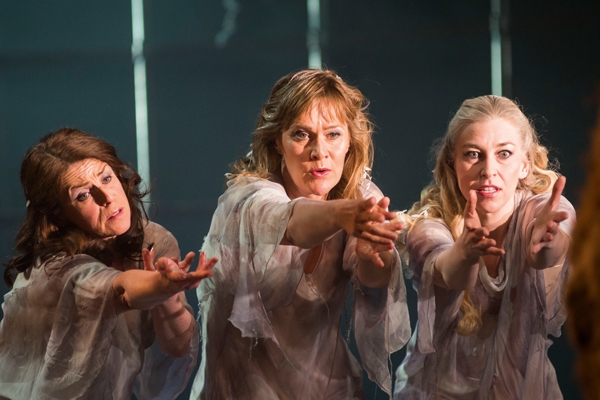There are no two ways about it: Wagner’s Ring cycle, the biggest challenge that any opera company can face, has been mounted with triumphant success in Longborough, and now presumably has been laid to rest. Nine years ago, at the Cambridge Arts Theatre, I saw the first attempt to stage it, in Jonathan Dove’s drastically cut version, and with skeletonic orchestration, and though there was some decent singing, on the whole I was unimpressed. I couldn’t believe that during the course of the following decade Martin and Lizzie Graham would succeed in turning a large chicken shed in Gloucestershire into a comfortable theatre, seating more than 400 spectators, and with a semi-sunken orchestra pit accommodating almost 70 players; even more incredible that they, working closely with Anthony Negus, should recruit singers who have been for the most part not only adequate but also thrilling, as their frequent poaching by other companies has demonstrated.
What remains mysterious is why Negus is not to be found conducting Wagner in the world’s leading opera houses, since he is as fine as any contemporary Wagnerian, and considerably superior to most. It is thanks to him that not only did the singers perform with all the virtues we associate with Reginald Goodall’s Wagner — clear enunciation; the nearest approach possible to bel canto, which Wagner always said he wanted, though he didn’t always write vocal lines that enabled it; and an avoidance of going into overdrive, even at the largest climaxes — but that the orchestra also played with such moving, sometimes heartbreaking eloquence, and that the musico-dramatic structures were so unerringly revealed.
This year I saw Das Rheingold at Longborough for the first time and, though it had many merits, it struck me as the least successful instalment of the Ring I had seen there. The ‘preliminary evening’, as Wagner called it, makes the largest demands on staging, and it’s not surprising that Alan Privett, the director, and Kjell Torriset, the designer, weren’t able to meet them; what was disappointing was that their substitutes for spectacular effects were often wayward. The Rhinegold itself, for instance, which should hardly present a problem, was a long tatty curtain, which proved very cumbersome for Alberich to take around with him, and even more tiresome to unfold. The stage at Longborough is small, so it may be a good idea to have a saucer, Wieland-Wagner style, tilted towards the audience, on which most of the action takes place, but that does limit what else there can be onstage. Most annoying is the ubiquity of three black-clad female actors, who are there from the very start, and who hop round the stage, obligingly handing Wotan his Perspex spear or taking it from him at convenient moments, but also working as general scene-shifters, while also tirelessly winding and unwinding the rope of Fate from or on to a large drum. No one in this Ring is, consequently, ever alone.
Das Rheingold is, among other things, hard-hitting drama about greed, contracts, and even ‘transparency’. The Alberich of Andrew Greenan made a powerful pivotal figure, terrible in suffering, above all when Wotan wrested the Ring from his finger; but making less than he should of the curious beauty of some of his music. His adversary and the Ring’s central figure was, for this and Die Walküre, Jason Howard, a youthful figure, less graceful in movement than anyone else onstage, and not helped by being dressed throughout as a tramp. There’s plenty wrong with Wotan, but he is always dignified, and often grand, as Howard wasn’t allowed to be. His singing was clear, reliable, he hardly tired, but it’s not an especially attractive voice. He was certainly shown up by the magnificent Fricka of Alison Kettlewell, transformed from three years ago, beautiful, anxious but self-righteous, a complete portrayal. The minor gods and the giants were tremendous. I found the least satisfactory performance Mark Le Brocq’s Loge: too loud, odiously self-satisfied, hogging the stage, and ridiculously costumed and made up. Rheingold should make you feel uneasy, and this one didn’t.
Die Walküre was on an altogether more exalted plane. If Andrew Rees’s higher notes were more reliable I’d say he was as good as any Siegmund I have seen: noble and suffering in appearance and acting, wonderfully tender and ardent with Sieglinde, and heroic in his defiance of Brünnilde, this was a great performance for which occasional allowances had to be made in Act I. None for the marvellous Brünnhilde of Rachel Nicholls, who is a sensation. Nor for the passionate and glowing Sieglinde of Lee Bisset, who instead of cowering stood up to the alarming Hunding — he got quieter rather than louder as he grew more angry, to brilliant effect — of Mark Richardson.
Act II of Walküre is, in my view, the emotional and moral centre of the whole cycle, and though I have seen and heard it performed by the greatest exponents of the chief roles, I have never found it more moving as a whole than here: the cumulative effect of Wotan’s humiliation by Fricka, his agonising coming to terms with the impossibility of his situation, Brünnhilde’s unwilling attempt to prepare Siegmund to leave Sieglinde on earth while he accompanies her to Valhalla, and the devastating battle in which Wotan intervenes for his son to be killed, left me flattened. If Act III moved me less than it should do, the fault was entirely mine. There are times when the first half of the Ring seems self-sufficient and enough, and this was one of them. In two years’ time Longborough has Tristan — that’s something to keep one going.






Comments